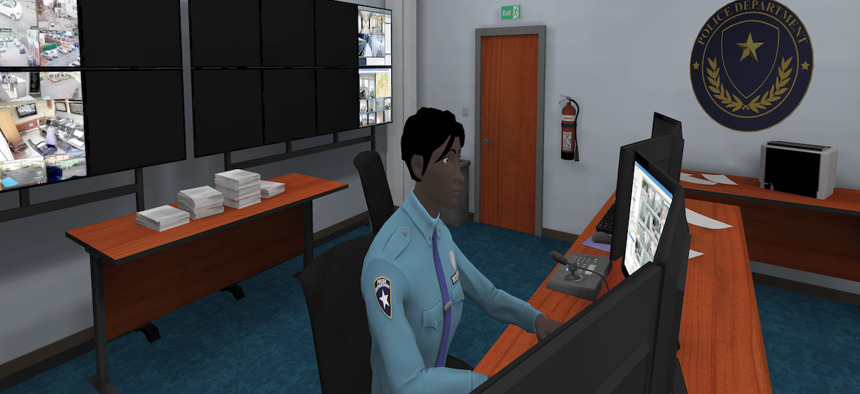Connecting state and local government leaders
The department in Schenectady, New York, is working with a local game development company on the program.
The video footage appears from the perspective of a police officer as he taps on the window of a parked car and asks to see the driver’s identification. As the man hands it over, the police officer’s partner suddenly draws his gun and points it into the car.
The first officer now faces an array of choices. Should he tell the man in the car to remain calm? Use his radio to call for backup? Or tell his partner to put away his gun? Each choice has consequences for the escalation, or de-escalation, of the situation—but they’re not life-or-death decisions, and do-overs are allowed. Because the video isn’t body-camera footage—it’s a virtual-reality simulation.
The program, under development by Schenectady, New York-based Catapult Games, is designed to give police realistic training in de-escalation techniques. Using VR headsets and controllers, officers step into simulations and make a series of decisions to determine the outcome of scenarios based on real-world encounters. It’s a more immersive learning experience than traditional methods of de-escalation training, typically based on video and textbook learning, said Dane Jennings, the company’s CEO.
“With virtual reality, you can frame techniques in a more effective way than a lot of traditional methods, because the user is completely immersed in a virtual world,” Jennings said. “They’re in control of everything they do, and it feels extremely realistic.”
The idea came to Jennings last summer, in the wake of national protests over the killing of George Floyd, a Black man, who died after a white Minneapolis police officer kneeled on his neck. Jennings reached out to a local community justice nonprofit, which arranged a meeting with Eric Clifford, chief of the Schenectady Police Department. The two agreed to partner on the project, an arrangement that allows police officers to test the program for free in exchange for feedback and suggestions on each simulation.
“I thought it was very intriguing,” Clifford said of the proposal. “If we were able to help him build it, and give input on what we think would be best for police officers to train on, that’d be even better. So we agreed to consult with them on their progress and give feedback as they were building the platform.”
Officials from Catapult began by building a prototype based on videos of police encounters— “things that went wrong and times where it went right,” Jennings said. When that first scenario was finished, police officers played through it and then offered critiques and suggestions, a process that’s since repeated several times as the developers tweak various things in the simulation.
Right now, for example, the developers are adding nuance to the simulation to complicate the in-game decisions.“We’d want to add more gray area in terms of, for example, finding out why your partner is drawing his gun,” Jennings said. “So we’ll add an option for you to ask him, so you’ll have more context into the decision. We are starting to also develop more simulations to get more breadth and depth into what we’re covering. We don’t want it to be one-sided.”
Both Jennings and Clifford hope to involve members of the public in the development process. Originally, the plan was to make the training module available for use at monthly feedback meetings, but that idea has been difficult to schedule due to ongoing restrictions on group gatherings during the pandemic. A growing coalition of community organizations is involved in the project, Jennings said, though he’d like to add more, including groups outside of Schenectady.
“We want to hear everyone’s voice as advisors for helping us craft scenarios and identify the correct response,” Jennings said. “That’s in addition to the feedback from police officers giving us a proper sense of protocol and the type of situations they run into. Our goal is really to make a comprehensive app that encompasses all perspectives.”
Eventually, that could include expanding the simulation itself, Clifford said—giving users the option to train as a police officer, or to experience an interaction as a person on the other side of an encounter with law enforcement.
“The other thing we’re keeping in mind while building this is to build it in a way where we could let the public use it so they could better understand what police officers go through,” he said. “We may want to have an A and a B scenario, where they’re both seeing the same thing, but the actions are different.”
Within six months, Jennings hopes to have a product that could be sold to police departments nationwide. Pricing remains unclear, though it’s likely it would be a subscription model, with regular updates as more scenarios are developed. The program will likely not replace traditional methods of de-escalation training, Clifford said—but it would be a new and useful enhancement.
“Just having more regular exposure to those scenarios is going to be one of the most beneficial things,” he said. “These are incidents that are happening in the community that we need to be prepared for, and that’s part communication, part training, and part exposure to what’s out there. The more we know, the better we can handle things.”
Kate Elizabeth Queram is a staff correspondent for Route Fifty and is based in Washington, D.C.

NEXT STORY: Data prep, analysis helps county keep probationers healthy and sheltered



